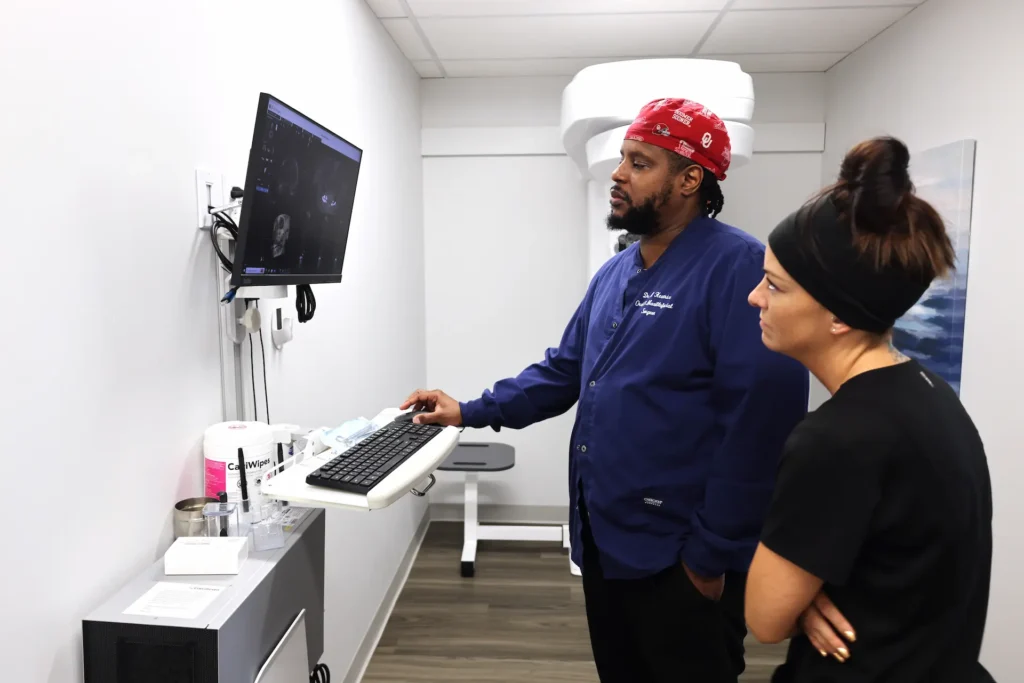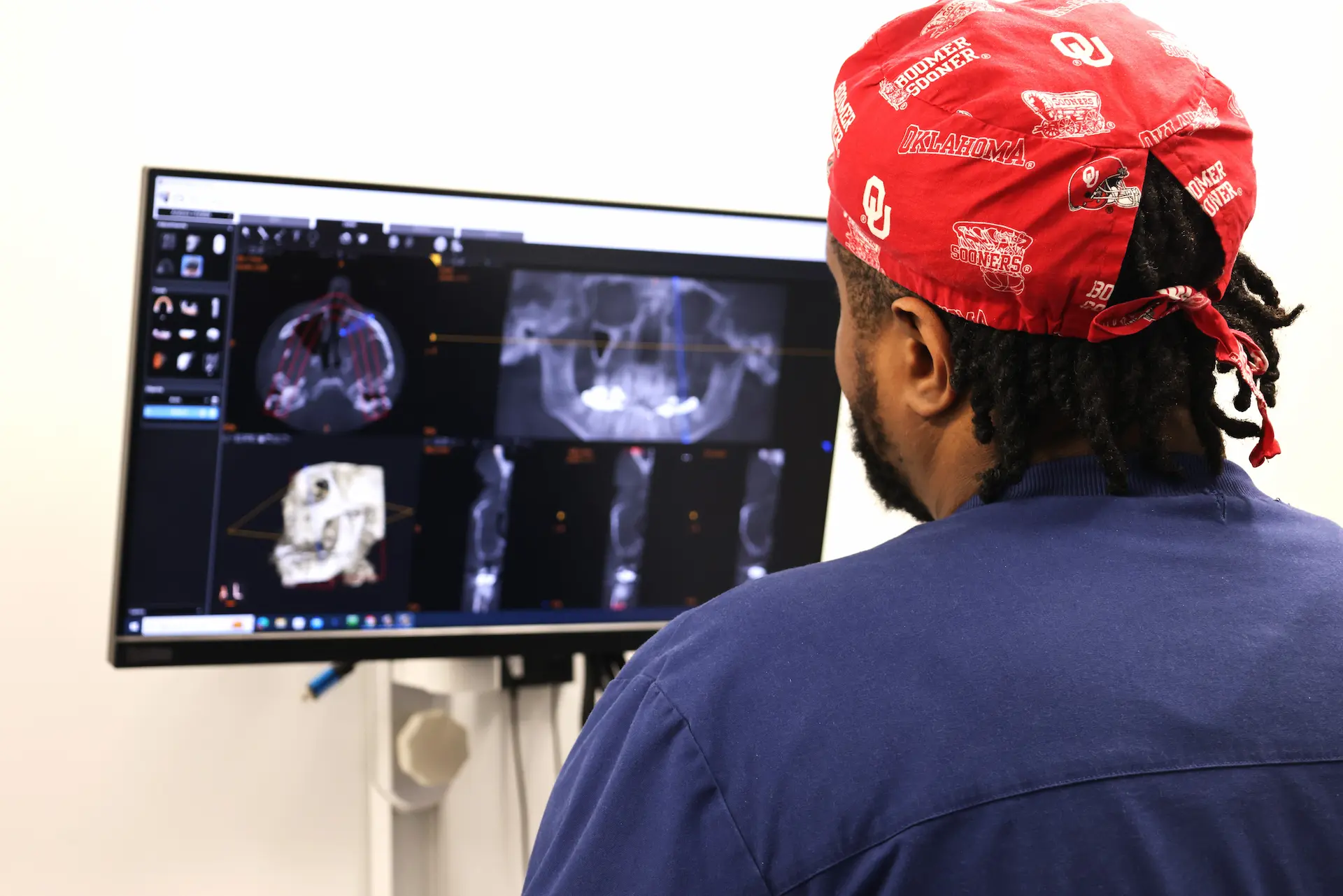Are you thinking about dental implants? They’re a fantastic option for replacing missing teeth and getting back a confident smile. But before you jump into surgery, there’s an important step: dental implant testing.
These tests might seem minor, but they play a big role in the success of your implants. Just like you wouldn’t build a house without a solid foundation, you don’t want implants placed without proper testing.
At NuSet Dental Implant and Oral Surgery, we prioritize thorough dental implant testing to ensure every patient receives the best possible outcome. By conducting various tests during our initial no-cost consultation, we can identify any potential issues early on and address them before they become significant problems.
What is a Dental Implant Test?
A dental implant test is a set of procedures used to evaluate if a patient is a good candidate for dental implants. These tests help us determine the condition of your oral health and ensure that the implant procedure will be successful.
The tests are generally non-invasive and painless. They include imaging tests like X-rays and CT scans, possible blood tests to check for underlying health issues, and physical examinations. These tests help us create a detailed and personalized treatment plan for each patient.
The Importance of Dental Implant Testing
Dental implant tests are designed to be quick and comfortable. Most don’t require any special prep on your end. Here’s what to expect:
Torque Test
A torque test measures the stability of the dental implant in the jawbone. During this test, we use a torque wrench to apply a specific amount of force to the implant. This test helps determine if the implant is securely anchored. A stable implant is less likely to fail and will provide a strong foundation for the dental prosthetic.
Bone Density Test
A bone density test evaluates the quality and strength of the jawbone. This test typically involves the use of X-rays or CT scans to measure the bone density around the implant site. A healthy, dense jawbone is crucial for the success of a dental implant because it provides the necessary support and stability.
Blood Test
A blood test checks the patient’s overall health, focusing on factors like immune system function and the presence of infections. This test helps identify any health issues that might affect the healing process or increase the risk of complications after the implant procedure.
Other tests may include clinical examinations and a review of the patient’s medical history.
These assessments help us understand the patient’s overall dental health and any conditions that might impact the success of the implant.
At NuSet, we utilize these comprehensive testing methods to ensure that our patients receive the highest standard of care. Our goal is to identify any potential issues early and address them effectively, ensuring a smooth and successful dental implant process.
Benefits of Dental Implant Testing

Dental implant testing offers numerous benefits that contribute to the success of the procedure. Here are some of the benefits of dental implant testing:
To ensure patient suitability
Dental implant tests help determine if a patient is a suitable candidate for implants. By evaluating factors such as bone density, oral health, and overall medical condition, dentists can ensure that only those who are likely to benefit from the procedure proceed with it. This reduces the risk of complications and increases the likelihood of a successful implant.
To reduce the risk of implant failure
Oral specialists can conduct thorough tests before the procedure to identify and address potential problems that might cause implant failure. For instance, a bone density test can reveal whether the jawbone is strong enough to support an implant. If it is too weak, the dentist can recommend bone grafting or other treatments to improve bone health before implant placement.
To personalize the treatment plans
The results of dental implant tests enable us to create personalized treatment plans tailored to each patient’s unique needs. This individualized approach ensures that all aspects of the patient’s oral health are considered, leading to better outcomes and higher patient satisfaction.
To enhance the longevity and success rate
Thorough testing and careful planning significantly enhance the longevity and success rate of dental implants. By ensuring that the implant is placed in a healthy, well-prepared site and addressing any underlying health issues, we can help patients enjoy their implants for many years without problems.
Risks and Considerations
Dental implant testing is a safe and essential step, but it’s natural to have questions about any procedure.
Most dental implant tests, such as X-rays and CT scans, involve minimal risks. The radiation exposure from these imaging tests is low and considered safe for most patients. However, patients who are pregnant or have certain medical conditions should discuss these risks with their oral surgeon to ensure safety.
Some tests may cause mild discomfort. For example, a torque test involves applying force to the implant, which can be slightly uncomfortable but is not painful.
Similarly, blood tests and physical examinations may cause temporary discomfort but are essential for gathering accurate health information.
While there are some risks associated with dental implant testing, the benefits outweigh these risks. The information obtained from these tests is vital for planning a successful implant procedure and avoiding complications.
Our specialists at NuSet prioritize patient safety and comfort during the testing process. We are committed to providing thorough explanations and addressing concerns, ensuring that our patients feel confident and well-prepared for their dental implant procedure.
The Positive Impact of Reliable Dental Implant Testing
Dental implant testing might seem like a hurdle, but trust us, it’s a positive step with big benefits.
Knowing you’ve undergone thorough testing gives you peace of mind and confidence moving forward with the implant procedure.
Here at NuSet, we take dental implant testing seriously. We use advanced technology and experienced professionals to conduct thorough assessments, ensuring a strong foundation for your implant success.
Schedule Your Consultation With Us Today!
Dental implants are a great choice for replacing missing teeth. They offer a long-term solution and restore your smile and confidence. But before the surgery, you must go through routine dental implant testing.
At NuSet, we prioritize thorough testing using advanced technology and experienced professionals. We believe this sets the stage for a smooth and successful implant procedure, ultimately leading to a smile that lasts.
Ready to take the first step towards a confident smile? Schedule a consultation with us now! Our team will answer your questions, guide you through the testing process, and help you achieve your desired smile.
Frequently Asked Questions
How are dental implants tested?
Dental implants are tested using several methods to ensure they are securely placed and functioning correctly. Common tests include:
- A torque test measures the stability of the implant by applying force and checking whether it remains firmly in place.
- A bone density test. This uses X-rays or CT scans to assess the quality and strength of the jawbone where the implant is placed.
- A clinical examination is carried out to check for signs of infection, proper healing, and overall oral health.
What is an implant test?
An implant test is a series of assessments performed to determine a patient’s suitability for dental implants and ensure the success of the implant procedure. These tests include imaging tests, torque tests, and blood tests.
How often should dental implants be checked?
Dental implants should be checked regularly to ensure they remain healthy and functional. The recommended frequency includes:
- Initial follow-up: This is typically 1-2 weeks after the implant procedure to check for initial healing and any signs of complications.
- Routine check-ups: Every 6 months during regular dental visits, similar to routine dental check-ups for natural teeth.
- Annual X-rays: Annual or bi-annual X-rays to monitor the bone around the implant and ensure it remains stable and healthy.
What blood tests are done for dental implants?
Blood tests for dental implants are conducted to assess the patient’s overall health and identify any potential risks that might affect the success of the implant procedure. These tests include:
- Complete Blood Count (CBC): This procedure evaluates the patient’s health and checks for infections or immune system issues.
- Blood Glucose Levels: To check for diabetes, which can affect healing.
- Inflammatory markers, such as C-reactive protein (CRP) levels, are used to assess inflammation and potential infection risks.





